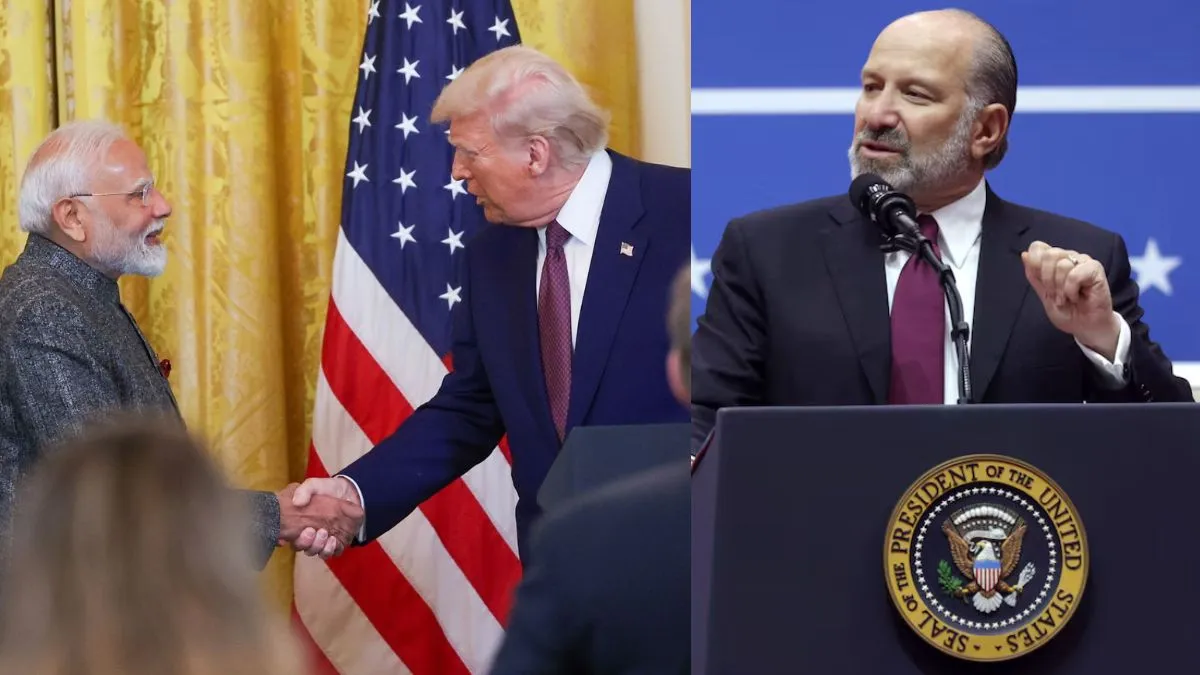- By Ajeet Kumar
- Fri, 05 Sep 2025 09:35 PM (IST)
- Source:JND
US Commerce Secretary Howard Lutnick on Friday has again made a bold claim that India would return to the negotiating table saying "sorry" and added US President Donald Trump would decide the next course of action. Expressing confidence, Lutnick said that India would return to the negotiating table within the next one to two months in an attempt to finalise a trade deal. Speaking to Bloomberg TV, Lutnick said he expects India to come back “saying sorry,” citing the United States' position as the world’s largest consumer market and asserting that “the consumer is always right.”
“I think, yes, in a month or two months… India is going to be at the table, and they’re going to say they’re sorry, and they’re going to try to make a deal with Donald Trump. And it will be on Donald Trump’s desk how he wants to deal with (Prime Minister Narendra) Modi. And we leave that to him,” Lutnick stated. "That's why he's the President,” he added.
⚡ "India either be with Russia and China or be with America. India doesn't yet want to open their market... stop buying Russian oil and stop being a part of BRICS. US is the biggest client of India, either support the dollar or pay 50% tariff. India would be at the table in a… pic.twitter.com/EuYu6fW5hg
— OSINT Updates (@OsintUpdates) September 5, 2025
Lutnick was also asked about Trump's Truth Social post where the American President wrote, “Looks like we've lost India and Russia to deepest, darkest, China. May they have a long and prosperous future together! President Donald Trump.” Trump also posted an old photo of Prime Minister Modi with Russian President Vladimir Putin and Chinese leader Xi Jinping.
Let's buy it cheap and make a ton of money: Lutnick on Russian oil purchase
Criticising India for its purchases of Russian oil, Lutnick said that before the Russian conflict, India bought less than two per cent of its oil from Russia and “now they're buying 40% of their oil from Russia. “What they're doing is, because the oil is sanctioned, it's really, really cheap because the Russians are trying to find people to buy it. And so the Indians have just decided, ‘Ah, the heck with it. Let's buy it cheap and make a ton of money',” he said.
ALSO READ: ‘India Will Continue Buying It': Nirmala Sitharaman Cites Economic Interests On Russian Oil Imports
Describing this as “just plain wrong” and “ridiculous”, Lutnick said India needs to decide which side it wants to be on. When asked if the US is willing to negotiate with India, he said, “We're always willing to talk.” He went on to say that “the Chinese sell to us. The Indians sell to us. They're not going to be able to sell to each other. We are the consumer of the world. People have to remember, it's our $30 trillion economy that is the consumer of the world. So eventually they all have to come back to the customer, because we all know eventually the customer is always right.”
Either support US, or pay tax: Lutnick
He said that India doesn't yet want to open its market, stop buying Russian oil and stop being a part of the BRICS. “They're the vowel between Russia and China (in BRICS). If that's who you want to be, go be it. But either support the dollar, support the United States of America, support your biggest client, who is the American consumer, or I guess you're going to pay a 50% tariff. And let's see how long this lasts,” he said.
When asked about the “hardening of the line” between Trump and Prime Minister Modi and if he sees any type of deal in the next 1-2 months, Lutnick cited the example of Canadian PM Mark Carney, saying he got elected “with this term elbows up, meaning, let's fight with America' but he finally dropped his retaliatory tariffs.
“So I think what happens is it's all bravado, because you think it feels good to fight with the biggest client in the world, but eventually your businesses are going to say you've got to stop this and go make a deal with America.”
Why is India purchasing Russian crude oil?
Defending its purchase of Russian crude oil, India has been maintaining that its energy procurement is driven by national interest and market dynamics. India turned to purchasing Russian oil sold at a discount after Western countries imposed sanctions on Moscow and shunned its supplies over its invasion of Ukraine in February 2022.
(With inputs from agency)

